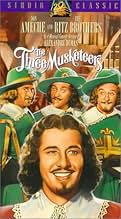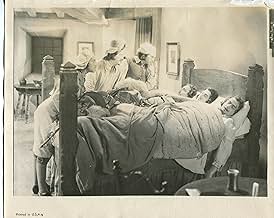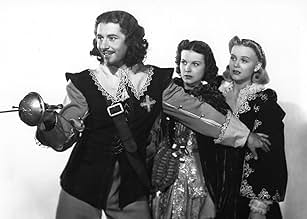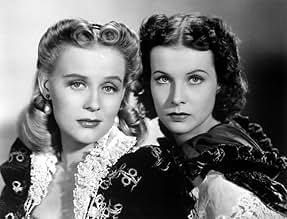VALUTAZIONE IMDb
5,9/10
720
LA TUA VALUTAZIONE
Aggiungi una trama nella tua linguaD'Artagnan sings and fronts for slapstick cowardly Ritz brothers posing as musketeers.D'Artagnan sings and fronts for slapstick cowardly Ritz brothers posing as musketeers.D'Artagnan sings and fronts for slapstick cowardly Ritz brothers posing as musketeers.
- Regia
- Sceneggiatura
- Star
Douglass Dumbrille
- Athos
- (as Douglas Dumbrille)
John 'Dusty' King
- Aramis
- (as John King)
C. Montague Shaw
- Ship Captain
- (as Montague Shaw)
Recensioni in evidenza
Three Musketeers, The (1939)
*** (out of 4)
D'Artagnan (Don Ameche) goes to join The Three Musketeers but he ends up teaming up with three misfits (The Ritz Brothers) posing as the Musketeers. I really wasn't expecting too much out of this film but found myself enjoying it throughout the short 73-minute running time. Ameche is terrific in his role and he pulls off the swordplay very nicely and his musical numbers are also very good. The Ritz Brothers have a poor reputation but so far I've enjoyed the two films of theirs that I've seen (the other being The Gorilla). This film also benefits from a very strong supporting cast, which includes Lionel Atwill, Gloria Stuart, Pauline Moore and a very funny John Carradine. The film stays pretty faithful to the original story with everything just kicked up a notch for comic situations.
*** (out of 4)
D'Artagnan (Don Ameche) goes to join The Three Musketeers but he ends up teaming up with three misfits (The Ritz Brothers) posing as the Musketeers. I really wasn't expecting too much out of this film but found myself enjoying it throughout the short 73-minute running time. Ameche is terrific in his role and he pulls off the swordplay very nicely and his musical numbers are also very good. The Ritz Brothers have a poor reputation but so far I've enjoyed the two films of theirs that I've seen (the other being The Gorilla). This film also benefits from a very strong supporting cast, which includes Lionel Atwill, Gloria Stuart, Pauline Moore and a very funny John Carradine. The film stays pretty faithful to the original story with everything just kicked up a notch for comic situations.
Silent film veteran Alan Dwan had helmed several of Douglas Fairbanks' best movies, and here turned out another swashbuckler, but with a difference: those zany Ritzes are on hand as a decidedly non-traditional trio of musketeers. Unlike the Marx Bros., whose movies were A-picture events, the now mostly forgotten Ritz Bros.' antics played in second features that failed to properly showcase their unique brand of knockabout comedy. Here they finally got a chance to perform in a good picture with a strong story and a good lead actor (Don Ameche as D'Artagnan) anchoring the proceedings, rather than just running about and being silly to no obvious purpose. The anarchic Ritzes here unleash their trademark catastrophic comedy to frustrate the machinations of Cardinal Richelieu and Lady deWinter. The Ritzes, of course, are not actual cavaliers, but rather a trio of dolts forced to masquerade as such to protect the Queen's honor. Much hectic action abounds, plus a few comedy songs, great silly costumes and a few of the Ritzes stage numbers such as a beautifully choreographed dance with cymbals on their bodies that must have taken years to perfect. The complex story is efficiently handled - the fat original novel plays out in a mere 72 minutes - and the straight action, heroically played by Ameche, and elaborately staged silliness of the Ritzes mixes well. An action comedy- musical would seem a difficult thing to blend correctly, but everything here is deftly handled and the cheapish production elements (leftover sets and contract players in supporting roles) do not hinder the overall effect. Worth going out of one's way to catch.
Often underrated by film buffs. Don Ameche has never been more charming or vibrant than in this parody of the Dumas classic. He is handsome, he can sing, and he is a great comic actor. The casting of the Ritz Brothers, however, is an obvious attempt to raise their comedic profile. It doesn't work, and their charm remains, as many reviewers have noted, an acquired taste. The script panders to the nonsensical impulses of the times. It is interesting to note that this film was released in 1939, the same banner year as "Gone with the Wind" and numerous other successful Hollywood productions.
A musical comedy version of the swashbuckling classic starring Don Ameche and the Ritz Bros? It sounds like a Catskill burlesque sketch, but turns out to be a straight, if bare-bones, version of Dumas, with mistaken identity (times 3) swapping Al, Jim & Harry in for Athos, Aramis & Porthos. Vet megger Alan Dwan was an old hand at this type of material (his THE IRON MASK/'29 -- in the restored KINO edition, please -- is one of the great Dumas adaptations) and the production has a giddying pace and a surprisingly sumptuous look to it. But the songs are unmemorable (to put it nicely) and leave an already short film with hardly enough time to fit in a measly Cliff Notes edition of the narrative.
Unlike what I wrote regarding THE COUNT OF MONTE CRISTO (1934), the opposite is true about Dumas’ “The Three Musketeers” – being perhaps overly-familiar with the narrative from multiple viewings of the 1948 and 1973/4 versions, and one of the Silent 1921 Douglas Fairbanks vehicle (incidentally, director Allan Dwan would 8 years later guide Fairbanks through the paces once more as D’Artagnan in THE IRON MASK), I didn’t need to concentrate on the complexities of the plot…even more so when one realizes how little of Dumas has been retained for this 73-minute musical comedy adaptation!
That said, in spite of it being something of a showcase for The Ritz Brothers’ particular brand of fooling, Fox and director Dwan didn’t skimp with the budget – so that the film looks exceedingly handsome and the action set-pieces are reasonably vivid (with D’Artagnan ably portrayed by a dashing, breezy and agile Don Ameche…who even has a penchant for utilizing Shakespeare quotes as pick-up lines!). Amusingly, the titular figures of Athos, Porthos and Aramis (one of them played by frequent Marx Brothers foil Douglass Dumbrille!) only turn up at the start; their hasty exit arises out of a drinking binge with the Brothers (actually cooks at a tavern) and, when D’Artagnan appears for his famous duel with the trio, he finds the Ritzes have taken their place (i.e. donned their costumes). Their explanation of this, however, is summarily interrupted by the arrival of Cardinal Richelieu’s men – which forces the gang to defend themselves the only way they know how, through slapstick, and subsequently to flee the tavern as D’Artagnan’s companions!
With this in mind, here we get a reversal of the central situation in the Dumas classic: whereas in the latter it was D’Artagnan who had to prove his mettle, in this case, he’s perfectly capable of dealing (almost single-handedly) with the swashbuckling side of business…even if he’s himself merely pretending to an official Musketeer’s position! Even so, the formerly plot-packed saga has been all but emaciated or, if you like, streamlined to accommodate The Ritz Brothers’ shtick (not always successful but generally quite decent and tolerable) as well as a handful of songs (of similarly variable quality but also just as charmingly old-fashioned). By highlighting the episode involving the retrieval of the Queen’s brooch, then, Milady De Winter’s contribution is noticeably diminished – being practically relegated to a mere lackey of Cardinal Richelieu’s!
In my introduction, I mentioned the classic 1934 version of THE COUNT OF MONTE CRISTO – which I’ve just watched; interestingly, the director of that film (Rowland V. Lee) followed it with an adaptation of “The Three Musketeers” in 1935: unfortunately, it’s been even more ignored over the years than the film under review – with which it shares cinematographer J. Peverell Marley and actor Miles Mander (appearing as King Louis XIII in 1935 and Cardinal Richelieu in 1939!) – coming so soon after the former, I guess prompted the tale’s conversion into a musical lampoon for the latter version. One of the factors which really intrigued me about Fox’s adaptation (recently released in a beautifully-packaged DVD edition, which I received only a couple of days ago) was the stalwart cast: apart from those already mentioned, we have Binnie Barnes (as Milady – at one point, subdued to the indignity of being searched upside down by the Ritzes for a crucial letter, to which comes the amusingly anachronistic quip “She’s a walking post office”!), Pauline Moore (making for a lovely Constance), Joseph Schildkraut (disappointingly, barely registering as the King), Gloria Stuart (graceful if a bit stiff as the Queen), Lionel Atwill (again, underused as Rochefort – the ambitious Cardinal’s right-hand man), John Carradine (a surprisingly uncharacteristic turn as a sniveling but greedy inn-keeper who, overhearing the Queen’s dilemma connecting her with the Duke of Buckingham, squeals everything to Richelieu) and Lester Matthews (the bland hero of WEREWOLF OF London and THE RAVEN {both 1935} is here the equally colorless Buckingham). Incidentally, the film might have worked even better were some roles to be exchanged – for instance, while Mander did pretty well by the Cardinal, I couldn’t help wondering what the more renowned Schildkraut or Atwill would have made of it!
In the long run, this particular version of “The Three Musketeers” (aptly dubbed THE SINGING MUSKETEER in the UK!) is best appreciated as a companion piece to The Ritz Brothers’ subsequent outing – THE GORILLA (1939; for which Dwan and Atwill were also recruited) – than as a faithful rendition of Dumas’ swashbuckling archetype (for which the adaptations I singled out early on are already sufficiently diverse and comprehensive to please most ardent fans)…
That said, in spite of it being something of a showcase for The Ritz Brothers’ particular brand of fooling, Fox and director Dwan didn’t skimp with the budget – so that the film looks exceedingly handsome and the action set-pieces are reasonably vivid (with D’Artagnan ably portrayed by a dashing, breezy and agile Don Ameche…who even has a penchant for utilizing Shakespeare quotes as pick-up lines!). Amusingly, the titular figures of Athos, Porthos and Aramis (one of them played by frequent Marx Brothers foil Douglass Dumbrille!) only turn up at the start; their hasty exit arises out of a drinking binge with the Brothers (actually cooks at a tavern) and, when D’Artagnan appears for his famous duel with the trio, he finds the Ritzes have taken their place (i.e. donned their costumes). Their explanation of this, however, is summarily interrupted by the arrival of Cardinal Richelieu’s men – which forces the gang to defend themselves the only way they know how, through slapstick, and subsequently to flee the tavern as D’Artagnan’s companions!
With this in mind, here we get a reversal of the central situation in the Dumas classic: whereas in the latter it was D’Artagnan who had to prove his mettle, in this case, he’s perfectly capable of dealing (almost single-handedly) with the swashbuckling side of business…even if he’s himself merely pretending to an official Musketeer’s position! Even so, the formerly plot-packed saga has been all but emaciated or, if you like, streamlined to accommodate The Ritz Brothers’ shtick (not always successful but generally quite decent and tolerable) as well as a handful of songs (of similarly variable quality but also just as charmingly old-fashioned). By highlighting the episode involving the retrieval of the Queen’s brooch, then, Milady De Winter’s contribution is noticeably diminished – being practically relegated to a mere lackey of Cardinal Richelieu’s!
In my introduction, I mentioned the classic 1934 version of THE COUNT OF MONTE CRISTO – which I’ve just watched; interestingly, the director of that film (Rowland V. Lee) followed it with an adaptation of “The Three Musketeers” in 1935: unfortunately, it’s been even more ignored over the years than the film under review – with which it shares cinematographer J. Peverell Marley and actor Miles Mander (appearing as King Louis XIII in 1935 and Cardinal Richelieu in 1939!) – coming so soon after the former, I guess prompted the tale’s conversion into a musical lampoon for the latter version. One of the factors which really intrigued me about Fox’s adaptation (recently released in a beautifully-packaged DVD edition, which I received only a couple of days ago) was the stalwart cast: apart from those already mentioned, we have Binnie Barnes (as Milady – at one point, subdued to the indignity of being searched upside down by the Ritzes for a crucial letter, to which comes the amusingly anachronistic quip “She’s a walking post office”!), Pauline Moore (making for a lovely Constance), Joseph Schildkraut (disappointingly, barely registering as the King), Gloria Stuart (graceful if a bit stiff as the Queen), Lionel Atwill (again, underused as Rochefort – the ambitious Cardinal’s right-hand man), John Carradine (a surprisingly uncharacteristic turn as a sniveling but greedy inn-keeper who, overhearing the Queen’s dilemma connecting her with the Duke of Buckingham, squeals everything to Richelieu) and Lester Matthews (the bland hero of WEREWOLF OF London and THE RAVEN {both 1935} is here the equally colorless Buckingham). Incidentally, the film might have worked even better were some roles to be exchanged – for instance, while Mander did pretty well by the Cardinal, I couldn’t help wondering what the more renowned Schildkraut or Atwill would have made of it!
In the long run, this particular version of “The Three Musketeers” (aptly dubbed THE SINGING MUSKETEER in the UK!) is best appreciated as a companion piece to The Ritz Brothers’ subsequent outing – THE GORILLA (1939; for which Dwan and Atwill were also recruited) – than as a faithful rendition of Dumas’ swashbuckling archetype (for which the adaptations I singled out early on are already sufficiently diverse and comprehensive to please most ardent fans)…
Lo sapevi?
- QuizMentioned in Leave It to Beaver Season 6, Episode 30, The Book Report. On the show, this version of The Three Musketeers airs on television. Beaver writes his book report based off of the movie instead of reading the book.
- BlooperDuring the scene where horsemen are chasing a carriage containing Milady and D'Artagnan along a country road, an electric power substation can briefly be seen in the background.
- Citazioni
D'Artagnan: She's a walking post office.
- ConnessioniFeatured in Big Sky: Do No Harm (2022)
- Colonne sonoreSong of the Musketeers
(1939) (uncredited)
Music by Samuel Pokrass
Lyrics by Walter Bullock
Played during the opening credits
Performed by Don Ameche and The Ritz Brothers twice
Sung by all the marhcing musketeers at the end
I più visti
Accedi per valutare e creare un elenco di titoli salvati per ottenere consigli personalizzati
- How long is The Three Musketeers?Powered by Alexa
Dettagli
- Data di uscita
- Paese di origine
- Lingua
- Celebre anche come
- The Three Musketeers
- Luoghi delle riprese
- Azienda produttrice
- Vedi altri crediti dell’azienda su IMDbPro
Botteghino
- Budget
- 1.000.000 USD (previsto)
- Tempo di esecuzione
- 1h 13min(73 min)
- Colore
- Proporzioni
- 1.37 : 1
Contribuisci a questa pagina
Suggerisci una modifica o aggiungi i contenuti mancanti





































